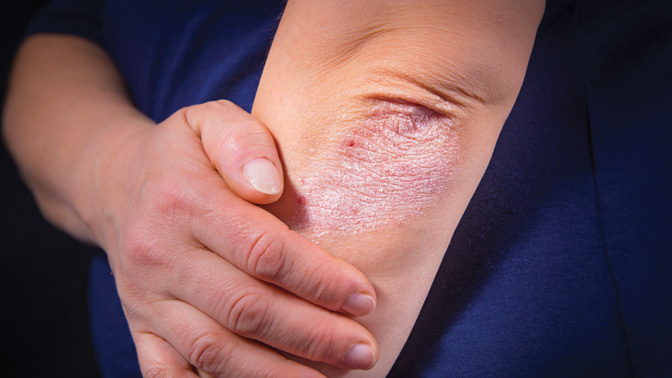
Your genetic makeup is more than 99 percent similar to that of every other person. So, if we share so much similarity in our genes, what makes us different?
Part of the reason for our differences is that we inherit gene variants—called alleles—from our parents. While many alleles can exist for any given gene, each of us only has two per gene: one allele comes from our father and the other allele comes from our mother.
The different allele combinations for each of our tens of thousands of genes result in different observable traits, such as height or eye colour.
A new study by Krembil Senior Scientist Dr. Dafna Gladman shows that allele variation may also explain why some people are more susceptible to psoriasis, a common immune-mediated skin disease, and its related arthritis, psoriatic arthritis.
To demonstrate this, Dr. Gladman and her research team focused on the KIR3DL1 gene, which encodes a protein that is known to play a key role in activating the immune system. The team developed a genetic method to identify different KIR3DL1 alleles and classify them into four categories based on the corresponding state of the protein: high levels of protein, low levels of protein, null (undetectable) protein, and a shortened form of the protein.
Using this novel approach, the team identified and categorized KIR3DL1 alleles from 652 people with psoriatic disease (including 260 patients with psoriasis only and 392 patients with psoriatic arthritis) and 371 people without the disease. They found that the null protein category was more frequent in those without psoriatic disease. There was no difference between those with psoriasis alone and those with psoriatic arthritis.
"Our results suggest that when alleles fall within the ‘null’ category, they may confer some type of protection against psoriasis," explains Dr. Gladman. "Our work lays the foundation for the development of clinical tools that may help clinicians better predict who is at risk for developing the disease, enabling earlier treatments and preventing long-term consequences."
This work was supported by the Krembil Foundation, the Canadian Institutes of Health Research and the Toronto General & Western Hospital Foundation.
Berinstein J, Pollock R, Pellett F, Thavaneswaran A, Chandran V, Gladman DD. Association of variably expressed KIR3dl1 alleles with psoriatic disease. Clin Rheumatol. 2017 Aug 11. doi: 10.1007/s10067-017-3784-5.

